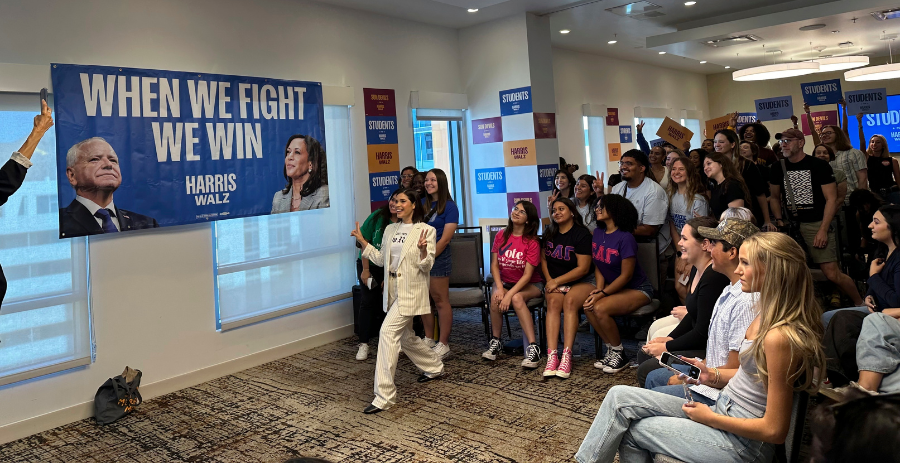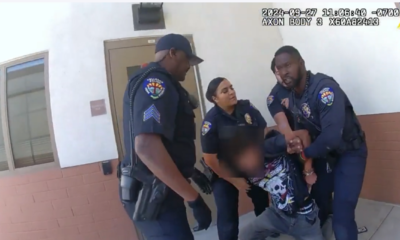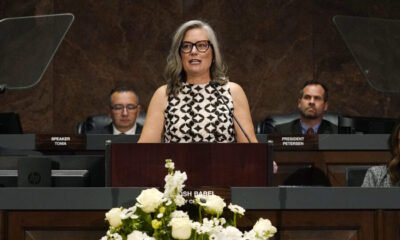2024 election
State Universities Counter Allegations of Harris Campaign Misusing Student Data

The state’s universities are defending themselves against accusations made by Senate Government Committee Chair, Sen. Jake Hoffman. He claims that they are unlawfully selling student data. University representatives assert that their actions comply with federal regulations requiring they make certain information public unless students choose to opt out.
Hoffman has expressed concerns regarding the legality of releasing personal information to a political campaign, particularly in light of recent text messages sent by Vice President Kamala Harris encouraging student voter registration. “The breach of students’ personally identifiable information to a political campaign raises serious ethical and legal concerns,” he asserted.
The text in question reminded students that “the deadline to register to vote in Arizona is Monday, Oct. 7.” It highlighted the potential impact of student voting in the upcoming election.
This situation has sparked a long-standing debate among Arizona Republicans regarding student voting. In 2020, a proposal by then-Representative Bob Thorpe aimed to classify dormitory residency as temporary, an effort that ultimately failed to advance.
Hoffman did not clarify whether his concerns were specifically about out-of-state students participating in local elections, which could significantly influence close races.
Mitch Zak, spokesperson for the University of Arizona, countered Hoffman’s claims, stating that directory information is available for request under federal law. “Students have the right to opt out of public disclosure at any time,” he noted.
This perspective is echoed by Jerry Gonzales from Arizona State University. He explained that student contact information is categorized as “directory information” under the Family Educational Rights and Privacy Act (FERPA), and it is commonly accessible to various organizations, including political campaigns.
Universities typically charge fees for access to this public data, with specific rates for commercial and non-commercial requests. Notably, requests from political candidates are not classified as commercial.
Both the University of Arizona and ASU confirm that students can opt out of having their information shared. Currently, a minimal percentage of students have made such requests.
Despite the controversy, universities maintain that the essential issue lies in the public availability of the data, rather than who specifically purchased it. “It’s open to anyone willing to pay the fee,” Zak added.
The texts refer recipients to a website sponsored by the Democratic National Committee for voter registration assistance, emphasizing the targeted outreach to younger demographics.
The Harris campaign recognizes the potential influence of student voters in the competitive Arizona electoral landscape, highlighting record turnout during the 2020 election cycle.
With differing viewpoints on the ethics of the situation, the universities stand firm on their legal position while local Republicans express concern over potential implications for data security and electoral integrity.
As the debate unfolds, stakeholders in Arizona’s voting landscape continue to assess the significance and consequences of student engagement in elections.






![Members of the Arizona House of Representatives vote during a third reading of nearly three dozen bills at the Arizona State Capitol on March 4, 2025. [Monica D. Spencer]](https://arizonanews.org/wp-content/uploads/2025/06/SR-347-Secures-53M-in-Third-State-Budget-Draft-Awaiting-400x240.jpg)
![Members of the Arizona House of Representatives vote during a third reading of nearly three dozen bills at the Arizona State Capitol on March 4, 2025. [Monica D. Spencer]](https://arizonanews.org/wp-content/uploads/2025/06/SR-347-Secures-53M-in-Third-State-Budget-Draft-Awaiting-80x80.jpg)










